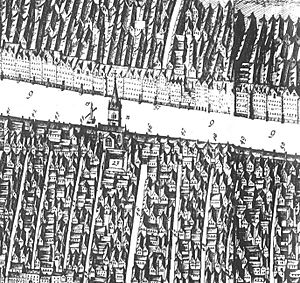Burgage facts for kids
A burgage was a special type of property rental used in towns across Great Britain and Ireland during the Middle Ages. It was a well-known system by the 1200s.
Imagine a town property, like a house, that was rented from a king or a powerful lord. This property, called a "burgage tenement," usually had a house on a long, narrow piece of land. This land often had a narrow front facing the street. The rent was usually paid in money, which was different from how people often paid rent in the countryside (where they might offer services instead). In older times, during the Saxon period in England, this rent was sometimes called a landgable or hawgable. As towns grew and more people moved in, these long burgage plots could be divided into smaller sections.
Contents
Burgages and Voting Rights
Before 1832, owning a burgage property could give you the right to vote for a Member of Parliament (MP) in some towns. In these places, the right to vote was directly connected to living in or owning certain burgage properties.
How Voting Worked
- Burgage properties could be bought and sold freely.
- If you owned a burgage, you could even let someone else, called a 'nominee', use your voting right for an election.
- Everyone's vote was recorded publicly. This meant the burgage owner could see how their nominee voted.
- A rich person could buy many burgages in a town. By doing this, they could control who was elected as the town's MPs.
- Towns where one person or family controlled most of the votes were called "pocket boroughs."
- Most burgage boroughs became pocket boroughs over time.
The End of Burgage Voting
This system of voting changed with the Great Reform Act of 1832. This new law made voting rights the same for everyone in all towns, ending the special voting power that came with owning a burgage.
Burgage Plots in Towns
In medieval England, Scotland, and parts of Wales, burgage plots were often long, narrow pieces of land that stretched out from the main street of a town. These plots were created by the lord who owned the land. They were like enclosed gardens or fields that were part of the town.
Who Were the Burgesses?
The people who rented these plots were called "burgesses." They were like the "citizens" of the town. Instead of providing services to the lord, they paid rent in cash. Burgesses were usually "freemen," meaning they had the right to work in a trade within the town and could help choose members of the town's ruling council.
Examples of Burgage Towns
- In 1207, Maurice Paynell, the lord of Leeds, created the first borough of Leeds. He gave a charter (a special document) to his burgesses to build a 'new town' along a street called Briggate.
- Some towns, like Burford in Oxfordshire or Cricklade in Wiltshire, still show signs of these old burgage plots today. The properties on the main road often have very long gardens behind them, because property boundaries have stayed the same for hundreds of years.
- In South Zeal, Devon, these plots were even called "borough acres."
Measuring Burgage Plots
The basic unit for measuring these plots was a "perch," which was about 5.5 yards (or 5 meters) long. Burgage plots were often measured in multiples of perches. For example:
- At Cricklade, most plots were 2 perches wide and 12 perches long (about 10 meters by 60 meters).
- At Charmouth in Dorset, a charter from 1320 described plots that were 4 perches wide and 20 perches long (about 20 meters by 100 meters). This made a typical plot about half an acre (0.2 hectares) and cost 6 pence in rent each year.
Burgages in Ireland
Burgage grants were also common in Ireland. For example, when the town of Wexford received its royal charter in 1418, English settlers were encouraged to move there. They were given burgage plots for a rent of one shilling per year. The Irish word for burgage was buiríos, and you can still see this word in many Irish place names today, like "Borris."
See also
- History of English land law
- Land tenure
- Grid plan
 | Emma Amos |
 | Edward Mitchell Bannister |
 | Larry D. Alexander |
 | Ernie Barnes |


